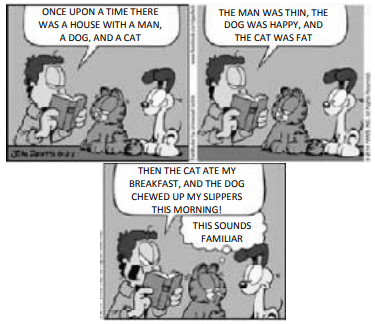Questões Militares
Sobre verbos | verbs em inglês
Foram encontradas 509 questões
Leia o texto, para responder à questão.
One pathway for converting explicit to implicit knowledge is suggested by skill acquisition theory, a branch of cognitive science studying how people develop skills. In this theory, knowledge is first seen to be declarative (conscious); then, through practice and the application of learning strategies, declarative knowledge becomes proceduralized so that it becomes automatic. Automatic processes are quick and do not require attention or conscious awareness. Many second/ foreign language learners memorize and practice vocabulary items or “chunks” of language such as greetings, idioms or collocations. Frequent practice in using these forms helps the language items to become automatic in the sense that the learner can use them quickly and unconsciously.
Pienemann (1989) proposes that second/ foreign language learners will not acquire a new structure until they are developmentallly ready to do so. If there were no connection between the development of explicit knowledge about a grammar point and the eventual restructuring of the unconscious linguistic system to accommodate the point in the learner’s interlanguage, then, indeed, grammar instruction would not be of much use. However, it has been suggested that there is a connection, so grammar instruction is ultimately useful. Further, practice of language points can lead to automatization, thus bypassing natural order teachability considerations.
(FOTOS, Sandra. Cognitive Approaches to Grammar Instruction.
In Marianne Celce-Murcia. 3rd ed. Teaching English as a second or foreign
language. 3rd edition. Boston, Massachusstes: Heinle&Heinle. 2002.
Adaptado274)
A correct example of a collocation with the verb “take” is found in alternative:
Leia o texto, para responder à questão.
This study reviews the findings of earlier translanguaging research in Saudi Arabia. Notably, Saudi Arabia is striving to adjust to the multilingual immigrant workforce on its soil, while encouraging a larger role for its people on other soils. In this changed paradigm, strengthening the Saudis’ English communicative proficiency is an emergent need. To make pertinent pedagogical recommendations on the use of translanguaging in language learning, the study gathered data using a questionnaire administered to 72 participants from King Faisal University. All participants were given fictitious names in order to protect their anonymity. Findings revealed that the Saudi EFL students strongly support the use of translanguaging in the EFL classrooms, but they are worried that it may not bring their proficiency to the desirable standard. They, thus, showed greater faith in the conventional language learning approach, viz., using only English in the EFL classes. The study concluded that learners‟ exposure to translanguaging is apparently not adequate for them to fully appreciate its benefits, and teachers who, so far, strictly keep to the English-only approach, too need to be oriented and trained in its use.
(Journal of Language and Linguistic Studies, 18(Special Issue 1),
556-568; 2022. Adaptado)
Assinale a alternativa que apresenta, corretamente, verbo que segue o mesmo processo de derivação morfológica encontrado em “encourage” e “strenghten”.
NON-COMISSIONED OFFICER OF THE YEAR
COMBAT ARMS NCO ACADEMY (ESA), Três Corações – Sergeant Major Rodrigo Pereira Menezes __________ (be) 17 years old when he ________ (decide) to become an NCO. He _______ (join) the Brazilian Army in March 7, 1994. He _______ (be) in the Army for 29 years. Since his graduation, he _______ (serve) in five different states across Brazil. For his exemplary service and impeccable career, the Combat Arms NCO Academy awards SGT MAJ Menezes with the prize NCO of the Year.
LOCAL TERRORISTS AMBUSH ROUTINE PATROL
Four soldiers were injured yesterday because a bomb ________ (explode) near their armored vehicle. The incident _______ (happen) at 4.30 pm while the soldiers _______ (return) to base after a routine patrol. Their vehicle _______ (travel) along the High Street when suddenly they _______ (have) to slow down because a bomb which was hidden in a rubbish bin _______ (explode).
Read the text and answer the question.

Read the text and answer the question.
The pursuit of happiness can end in pain
Maggie Mulqueen, psychologist

Adapted from https://www.nbcnews.com/think/opinion/suicide-studentathletes-happiness-contentment-rcna27992
Choose the best alternative to fill in the box and complete the sentence correctly.

Disponível em: <https://www.rd.com/list/military-cartoons/>.Acesso em nov.2021
Mark the option that correctly completes the sentence below
“My parents are seriously thinking about _______________ to Canada.”
Liz Truss is _________ under pressure from Tory MPs to ensure benefits rise in line with prices, with minister Penny Mordaunt arguing it "makes sense". Former PM Boris Johnson _________ benefits would rise with inflation. Ms Truss has refused to say she _________ maintain the commitment, as she faces questions over how to pay for her government's tax-cutting plans. The PM told the BBC a decision _________ yet been made, as the issue dominated Tory party conference in Birmingham. Speaking to Times Radio, Ms Mordaunt said: "We tomake sure that people are looked after and that people can paytheir bills. We are not about _________ to help people with one hand and take away with another." _________ if she welcomed Ms Mordaunt _________ her views public, Ms Truss said: "I _________ forward to having those discussions."
(https://www.bbc.com/news/uk-politics-63125506 )
Language-centered methods are those that seek to provide opportunities for learners to practice preselected linguistic structures through form-focused exercises in class. The assumption is that language practice will ultimately lead to a mastery of the target language and that learners can draw from this formal repertoire whenever they wish to communicate in the target language outside the class. According to this belief, language development is largely intentional rather than incidental; and language learning seen as a linear, additive process.
Learner-centered methods are those that are principally concerned with language use and learner needs. These methods seek to provide opportunities for learners to practice preselected, presequenced grammatical structures as well as communicative functions (i.e., speech acts such as apologizing, requesting, etc.) through meaning-focused activities. Proponents of learner-centered methods believe in accumulated entities, represented by structures plus notions and functions.
Learning-centered methods are those that are principally concerned with learning processes. These methods seek to provide opportunities for learners to participate in open-ended meaningful interaction through communicative activities or problem-solving tasks in class. The assumption is that a preoccupation with meaning-making will most likely lead to grammatical as well as communicative mastery of the language and that learners can learn through the process of communication. In this approach, unlike the other two, language development is a nonlinear process and considered more incidental than intentional. Proponents of learningcentered methods believe that language is best learned when the learner’s attention is focused on understanding, saying and doing something with language, and not when their attention is focused explicitly on linguistic features.
(Kumaravadivelu, B. Beyond Methods: Macrostrategies for language learning. Haven and London: Yale University Press. 2003. Adaptado)
Implications of the humanistic approach
Hamachek (1977) provides some useful examples of the kind of educational implications that follow from taking a humanistic approach. First, every learning experience should be seen within the context of helping learners to develop a sense of personal identity. This is in keeping with the view that one important task for the teacher is differentiation, i.e. identifying and seeking to meet the individual learner’s needs within the context of the classroom group. Second, learners should be encouraged to make choices for themselves in what and how they learn. This again is in sharp contrast to the view that the curriculum content for every learner of a similar age should be set in ‘tablets of stone’. Third, it is important for teachers to empathise with their learners by seeking to understand the ways in which they make sense of the world, rather than always seeking to impose their own viewpoints. Fourth, it is important to provide optimum conditions for individualised and group learning of an authentic nature to take place.Thus, from a humanistic perspective, a learning experience of personal consequence occurs when the learner assumes the responsibility of evaluating the degree to which he or she is personally moving toward knowledge rather than looking to an external source for such evaluation.
(Williams, M.; Burden, R.L. Psychology for Language Teachers: A Social Constructivist Approach. Cambridge:CUP, 1999. Adaptado)
The regional accentism that secretly affects life prospects

At age 22, Gav Murphy was living outside his home country Wales for the first time, working in his first job in media production in London. His South Wales Valleys accent was very thick, he recalls. He’d say ‘tha’ rather than ‘that’, for instance. He was perfectly understandable; yet a senior colleague overseeing his work insisted Murphy change his accent so all the broadcasters sounded uniform on air. The effects of adaptation were far-reaching. “It sort of broke my brain a little bit,” says Murphy. “I thought about literally every single thing I was saying, literally every time I was saying it. Moving to standard English was just laborious.”
Foreign-accent discrimination is rampant in professional settings. But discrimination can also extend to certain native speakers of a language, because of the judgements attached to particular accents. While many employers are becoming very sensitive to other types of bias, accent bias remains challenging to root out. But it doesn’t have to be this way.
While the cognitive shortcuts that contribute to accent bias may be universal, the degree of accent awareness and prejudice varies greatly. For instance, “The UK has a very, very fine-tuned system of accent prestige,” says Devyani Sharma, a sociolinguist at Queen Mary University of London. “It’s a combination of a very monolingual past, where English developed as a symbol of the nation, and the very acute social class hierarchy historically.” She adds that overt accent bias in the US is based more on race, whereas in the UK, it’s more tied to class.
In some cases, accent bias is directly related to government policy. Since the 1860s, the Japanese government has modernised the country with a focus on Tokyo, says Shigeko Kumagai, a linguist at Shizuoka University, Japan. “Thus, standard Japanese was established based on the speech of educated Tokyoites.” In contrast, the Tohoku dialect spoken in northern Japan became “the most stigmatised dialect in Japan”, says Kumagai. Its image is “rural, rustic, old, stubborn, narrow-minded, backward, poor, uneducated, etc”. Young women from Tohoku are often given discriminatory treatment that makes them feel ashamed of their accents.
A pesquisa de Kumagai mostra que a forte estereotipagem do dialeto Tohoku é perpetuada pela concentração da indústria de mídia na capital japonesa. De fato, em todo o mundo, a mídia tem um impacto enorme na percepção dos sotaques. Portanto, entendemos por que a preponderância de emissoras do Reino Unido em Londres provavelmente contribuiu para a marginalização do sotaque galês de MurphyKumagai’s research shows that the strong stereotyping of the Tohoku dialect is perpetuated by the concentration of the media industry in the Japanese capital. Indeed, the world over, the media has an enormous impact on perceptions of accents. So we understand why the preponderance of UK broadcasters in London likely contributed to the marginalisation of Murphy’s Welsh accent.
(Christine Ro. www.bbc.com, 08.05.2022. Adaptado)


The sentence “But I’ve developed a new philosophy” is an example of Present Perfect. Choose the alternative which follows the same grammar rule.
Cargo ship carrying Porsches and Bentleys is burning and adrift at sea
À fire_________ Wednesday morning on the Felicity Ace, a ship about 650 feet long, near Portugal's Azores Islands, according to the Portuguese navy. The ship had departed from Emden, Germany, on Feb. 10 and was scheduled to arrive in Davisville, R.l., next week, according to a ship tracking website.
(Adapted from https://Awww.washingtonpost.com/)
The Portuguese navy_______ all 22 crew members via helicopter. Authorities _________the rescue mission as “highly skilled and physically demanding.” The crew members______ to a hotel on Faial Island in the Azores. Nobody_______ in the fire.
(Adapted from https:/Avww.washingtonpost.com/)